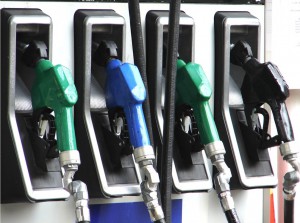With sales of truck and utility vehicles continuing to rise, the average fuel economy window-sticker value of new vehicles sold in the U.S. in February was 25.1 mpg—unchanged from the value for January, according to the University of Michigan Transportation Research Institute.
The value for February is up 5.0 mpg since October 2007, the first month of UMTRI began tracking it, but down 0.4 mpg from the peak of 25.5 mpg reached in August 2014.
The short-term number continues to decline as gas prices remain below $2.50 per gallon. Since the dramatic fall in fuel prices nearly two years ago, buyers have been buying full-size trucks and SUVs in ever-increasing numbers, driving the average down.
The University of Michigan Eco-Driving Index (EDI) – an index that estimates the average monthly emissions of greenhouse gases generated by an individual U.S. driver – was 0.83 in December 2016, unchanged from the value for November 2016 (the lower the value the better).
This value indicates that the average new-vehicle driver produced 17% lower emission levels in December 2016 than in October 2007, but that figure is 5% higher than the record low reached in November 2013.
(Opel Insignia offers strong hint of next Buick Regal. Click Here for the story.)
The EDI takes into account both vehicle fuel economy and distance driven using data published with a two-month lag.
A new report from Consumer Union, the publisher of Consumer Reports, finds that car buyers are getting better fuel efficiency at a lower cost.
New car prices have remained relatively flat during the past 20 years, according to the report, and used car prices have actually fallen. Both occurred as fuel economy continued to increase. The findings rebut automaker claims that increasing fuel efficiency hurts car buyers, Consumers Union said.
(Click Here to find out why it could take years to wrap up the Opel deal.)
“The new analysis demonstrates that fuel efficient technology pays for itself and is a boon to car and truck buyers that benefit from the savings greater efficiency offers,” said Shannon Baker-Branstetter, policy counsel for Consumers Union. “In fact, had it not been for fuel economy standards, the average consumer would be paying $523 more in annual fuel spending.
“Multiplied by millions of new cars each year, that’s billions of dollars going back into our economy, and supporting thousands of jobs. Fuel economy standards are a win-win for everyone,” said Baker-Branstetter.
(To see the muscled-up Honda Civic Type R in Geneva, Click Here.)
However, the automakers, led by Ford Motor Co. Chief Executive Officer Mark Fields, asked the Trump administration to roll back fuel economy standards that were approved during the final days of the Obama administration. The Trump administration’s announcement on that request is expected soon.

